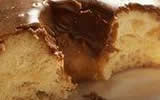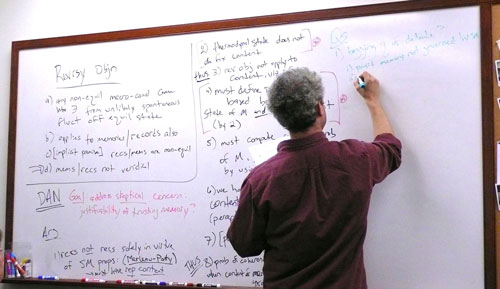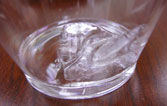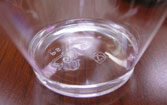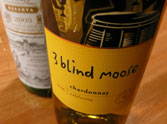::: center home >> being here >> last donut? >> ice |
22 October 2008 Some time way back in the heroic era of the foundation of statistical physics, Ludwig Boltzmann conceived a striking vision. It is a universe of atoms and molecules in thermal equilibrium persisting so long that, spontaneously, they clump together momentarily to form unlikely associations. The molecules of a puddle of water may, through a concidence of random motions, separate out in a cold ice cube and a warm residual, if only we wait long enough. This is a spontaneous reversal of the second law of thermodynamics, the high entropy puddle evolves to the low entropy ice. This wild fantasy was a theoretical necessity for Boltzmann. He needed to answer a fundamental challenge to his molecular account of thermal systems. There is basic fact about how molecules interact: they don't care about the direction of time. Any process that can go one way in time can go in the reverse way as well. How, Boltzmann was asked, could that fact be squared with our common experience of thermal systems. Ice cubes in a glass of water melt; we never see the reverse of water separating out an ice cube. Now here was Boltzmann's ingenious answer. Wait long enough in his universe and you will! There is an awkward corollary of Boltzmann's vision. It is that nothing comes about the way it may seem. Take a half melted ice cube. Then, the story goes, it most likely arose in a fluctuation from a puddle than from the melting of whole ice cube. For the creation of a whole ice cube by a fluctuation is vastly more improbable than the creation of a half melted cube. This ingenious vision has long gripped the imagination of philosophers of physics. There is, in my view, no good reason to think it could obtain in our universe, if we want to preserve even a shred of our best science. The time needed for ice to spontaneously separate out from water vastly exceeds the age of the universe since the big bang. But the idea of ice cubes spontaneously popping into being from water raises eyebrows. Does science really allow that in any universe? This is the topic of our reading group today. Dan Parker has supplied us a text with the delightful title, "Was There an Ice Cube There Or Am I Just Remembering It?" He is tackling the question of how seriously we should take Boltzmann's fantasy. Our protocol is that the Fellow who supplies the reading does not speak, initially. Someone else presents the basic ideas to the room. Erik had volunteered and, much to my approval, was covering the whiteboard with a synopsis of Dan's arguments. Dan's paper had clearly grasped our imaginations, for the interruptions to Erik's exposition were so persistent that his ten minutes grew to three quarters of an hour of energetic discussion.
What was grasping us was a universal philosophical leitmotif now appearing deep within our science. Philosophers love to imagine that things are not the way they seem. Perhaps we are brains in vats and all our experiences are fabricated by an evil scientist. Or perhaps the world was created last Wednesday complete with its fossil record, misleading us into false suppositions of an ancient earth. There are a hundred more narratives varying these themes. Here is Boltzmann's variation. Our world with us in it was created just now as a fluctuation, replete with spurious memories of older, more orderly times. Should we now take these delusional fantasies seriously because they have the imprimatur of statistical physics? Our instincts rebel and here Dan assures us that we are right to. His starting point is a simple observation. Boltzmann's argument assures us that low entropy states arise most likely as a random fluctuation. His argument does not assure us of something stronger, that low entropy states containing well-ordered records of a lower entropy past arise most likely as fluctuations. In Boltzmann's world, ice in water in more likely to have arisen as a fluctuation from water. But his argument does not assure us that ice, imprinted with the shape of an icecube tray, is more likely to have arisen as a fluctuation. For the extra specializing property of the trace of the ice cube tray is simply outside Boltzmann's argumentation. My own feeling was that this point alone was sufficient to derail the modern fantasists, working in Boltzmann's shadow, for they are now unable to complete their argument to the speciousness of our records. But Dan had much more to say in his paper. The discussion ranged to and fro as we explored its paragraphs.
So I filled my basket. I paused for a moment over the "Three Blind Moose" chardonnay, musing that it has to be pretty good or they couldn't give it that silly name.
It was close to midnight when everyone filed towards the door. "Sorry about the chardonnay," I called down the stairs. John D. Norton |

